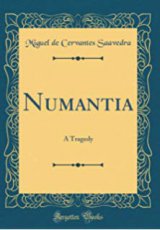The Siege of Numantia Page #8
The Siege of Numantia is a tragedy by Miguel de Cervantes set at the siege of Numantia. The play is divided into four acts. The dialogue is sometimes in tercets and sometimes in redondillas, but for the most part in octaves.
Fourth Numantine. It seemeth good to me, before we dare The desperate act which promises relief, That we should summon from the rampart there Our haughty foe, and ask of him in brief: That he will grant an open field and fair To one Numantian, and one Roman chief, And that the death of either in the fight Shall end our quarrel and decide the right. These Romans are a people of such pride That they will sanction what we now propose; And if by this our challenge they abide, Then sure am I our griefs will have a close; For here sits Corabino at our side, Upon whose mighty valour I repose, That he alone, in open fight with three, Will from the Romans snatch the victory. 'Tis also fitting that Marquino here, Whose fame as sage diviner is so great, Should note what sign or planet in the sphere Forbodeth death to us, or glorious fate; And find some means perchance to make it clear, If we shall issue from our present strait, When once this doubtful cruel siege has passed, The victors or the vanquished at the last. Be it as well our first and chief concern To make to Jove a solemn sacrifice; It well may be that thereby we shall earn A boon still higher than the proffered price. If by such aid supernal we shall learn To staunch the wounds of our deep-rooted vice, Then haply may our rugged fates relent, And change to brighter fortune and content. There never lacketh opportunity to die, The desperate may have it when inclined; The fitting time and place are always nigh To show in dying the determined mind. But lest the passing hours in vain should fly, Say if ye now approve what I've designed, And if ye do not, then devise some plan Will better suit, and pleasure every man. MARQUINO. There is good reason in thy sage advice; Its weighty counsel is approved by me; Prepare the offering and the sacrifice, And let the challenge quick delivered be. As for myself, I'll hasten in a trice To show my science in supreme degree; For one I'll drag from out the heart of Hell Our future, be it good or bad, to tell. THEOGENES. I herewith offer me, if so indeed Ye can but trust my valour and my might, To sally forth, if it be so decreed, And be your champion in the single fight. CORABINO. Thy valour rare deserves a better meed; We well may trust--it is thy patent right-- Affairs by far more difficult and grave To him who is the bravest of the brave. And since the chiefest place is at thy call, Due to thy worth, by general assent, I, who esteem myself the least of all, Will act as herald of this tournament. First Numantine. Then I, with all the people, great and small, Will do what gives to Jove the most content; For prayers and sacrifice have mighty sway, When purged and contrite hearts prepare the way. Second Numantine. Now let us go, with ready wills and free, To do as we have sworn, whate'er befall, Before pale hunger's gnawing misery Hath brought us to the last extreme of all. Third Numantine. If Heaven already hath pronounced decree That we are doomed in dire distress to fall, May Heaven revoke it now, and aid us soon, If our contrition meriteth the boon. SCENE II. Enter first two Numantine soldiers, MORANDRO and LEONCIO. LEONCIO. Where, Morandro, dost thou go? What strange errand hast thou got? MORANDRO. If myself do know it not Just as little wilt thou know. LEONCIO. Would that amorous whim of thine I could pluck from out thy pate! MORANDRO. Nay, my reason hath more weight Since I felt this flame of mine. LEONCIO. 'Tis a fact, undoubted lore, That the love-devoted swain Hath, by reason of his pain, Weightier reason than before. MORANDRO. What thou speakest thus to me, Is it wit, or malice, friend? LEONCIO. Thou my wit mayst apprehend, I, thy pure simplicity. MORANDRO. Am I simple, loving well? LEONCIO. Yes, if love will not allow For the whom, and when, and how; Ask thy reason, it will tell. MORANDRO. Who can bounds assign to love? LEONCIO. Reason's self will show them thee. MORANDRO. Reasonable will they be, But of slender value prove. LEONCIO. What of reason is there, pray, In the amorous endeavour? MORANDRO. Love 'gainst reason goeth never, Though it go some other way. LEONCIO. Is it not beyond all reason, Gallant soldier as thou art, Thus to show a lover's heart, In this sad and straitened season? At a time when thou art bound Round the god of war to rally, Is it meet with love to dally, Scatt'ring thousand sweets around? See thy country in a stir, Enemies before, behind, And wilt thou, with troubled mind, Turn to love, and not to her? MORANDRO. Thus to hear thee idly speak, Makes my blood with fury dance. When did love, by any chance, Make the manly bosom weak? Do I leave my post to fly To my lady's side instead, Or lie sleeping on my bed, When my captain watches by? Hast thou seen me fail to move At the urgent call of duty, Lured away by wanton beauty, Or still less by honest love? If with truth thou canst not tell Any point wherein I fail, Wherefore thus against me rail, Just because I love so well? If I shun the circles bright, Brooding o'er my sad condition, Put thyself in my position, Thou wilt see that I have right. Know'st thou not how many years I was mad for Lyra's sake, Till at length the clouds did break, Scatt'ring all my doubts and fears? For her father gave consent That we twain should wedded be; And my Lyra's love for me, Mine for her, gave full content. But, alas! thou art aware How this brutal, cruel war Came our happiness to mar, Sunk my glory to despair. For our marriage may not be Till the din of war hath ceased; 'Tis no time to wed and feast Till this land of ours be free. Think what slender hope is here That my bliss will ever be, When our chance of victory Rests upon the foeman's spear! Here we are with ruin near us, Fosse and trench around us lying, All our men with hunger dying, And no thought of war to cheer us! Is it strange, that when I know All my hopes are but as wind, I should go with saddened mind, Just as now thou seest me go?
Translation
Translate and read this book in other languages:
Select another language:
- - Select -
- 简体中文 (Chinese - Simplified)
- 繁體中文 (Chinese - Traditional)
- Español (Spanish)
- Esperanto (Esperanto)
- 日本語 (Japanese)
- Português (Portuguese)
- Deutsch (German)
- العربية (Arabic)
- Français (French)
- Русский (Russian)
- ಕನ್ನಡ (Kannada)
- 한국어 (Korean)
- עברית (Hebrew)
- Gaeilge (Irish)
- Українська (Ukrainian)
- اردو (Urdu)
- Magyar (Hungarian)
- मानक हिन्दी (Hindi)
- Indonesia (Indonesian)
- Italiano (Italian)
- தமிழ் (Tamil)
- Türkçe (Turkish)
- తెలుగు (Telugu)
- ภาษาไทย (Thai)
- Tiếng Việt (Vietnamese)
- Čeština (Czech)
- Polski (Polish)
- Bahasa Indonesia (Indonesian)
- Românește (Romanian)
- Nederlands (Dutch)
- Ελληνικά (Greek)
- Latinum (Latin)
- Svenska (Swedish)
- Dansk (Danish)
- Suomi (Finnish)
- فارسی (Persian)
- ייִדיש (Yiddish)
- հայերեն (Armenian)
- Norsk (Norwegian)
- English (English)
Citation
Use the citation below to add this book to your bibliography:
Style:MLAChicagoAPA
"The Siege of Numantia Books." Literature.com. STANDS4 LLC, 2024. Web. 24 Nov. 2024. <https://www.literature.com/book/the_siege_of_numantia_60>.




Discuss this The Siege of Numantia book with the community:
Report Comment
We're doing our best to make sure our content is useful, accurate and safe.
If by any chance you spot an inappropriate comment while navigating through our website please use this form to let us know, and we'll take care of it shortly.
Attachment
You need to be logged in to favorite.
Log In